-2023届高三英语二轮复习:英文诗歌鉴赏课件(42张ppt)
文档属性
| 名称 | -2023届高三英语二轮复习:英文诗歌鉴赏课件(42张ppt) | 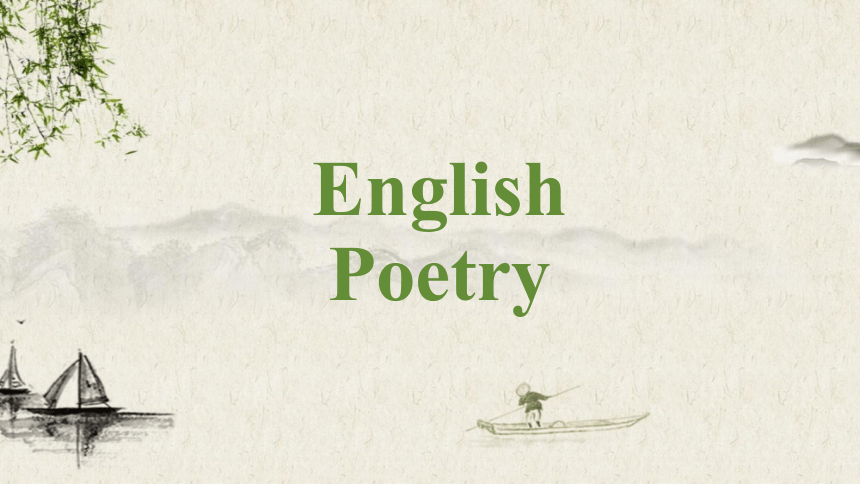 | |
| 格式 | pptx | ||
| 文件大小 | 961.6KB | ||
| 资源类型 | 教案 | ||
| 版本资源 | 通用版 | ||
| 科目 | 英语 | ||
| 更新时间 | 2022-10-16 11:31:53 | ||
图片预览

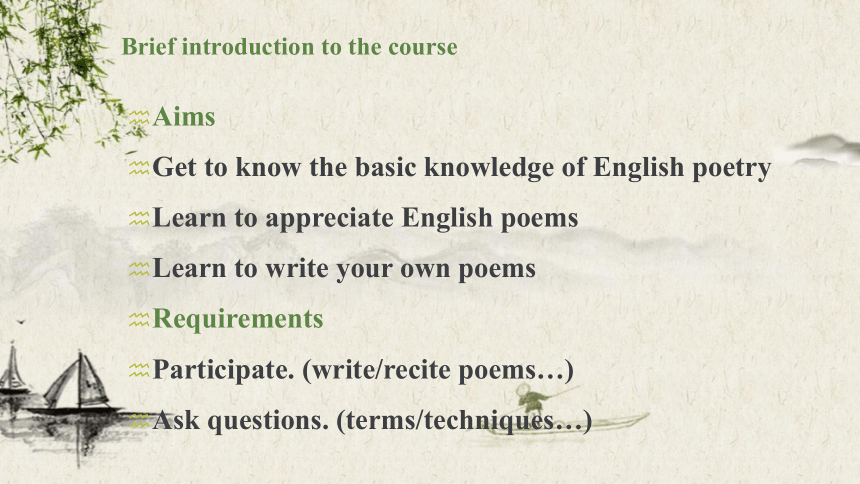
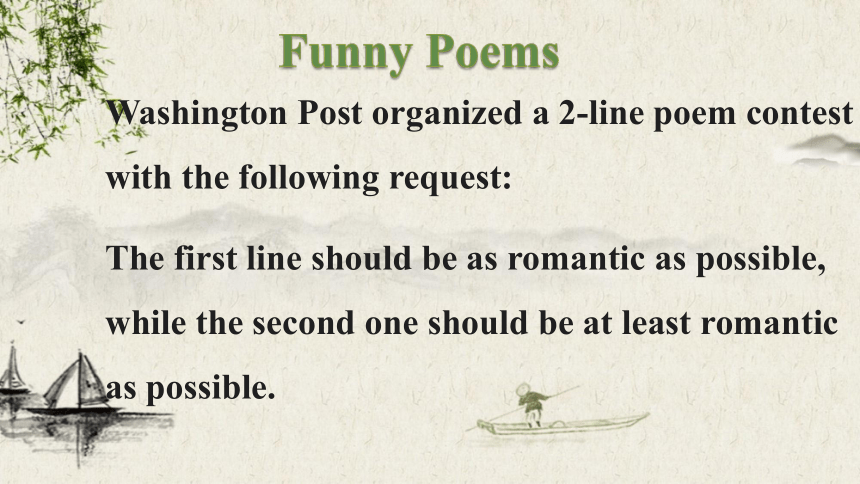
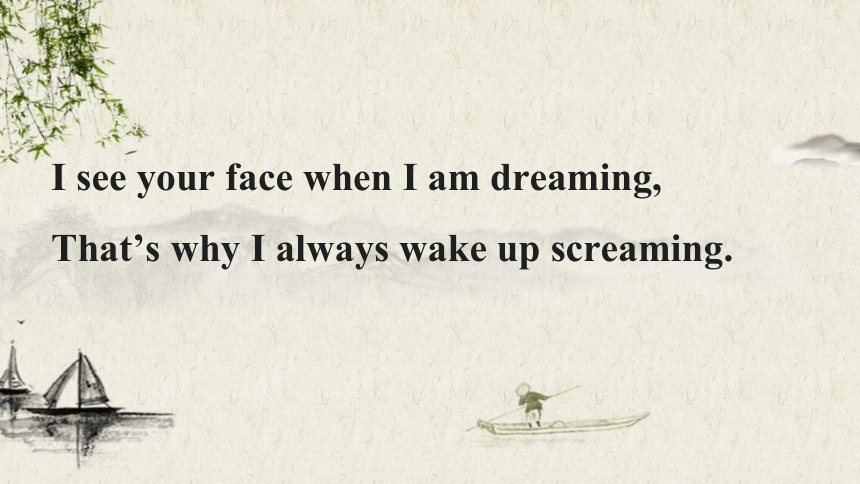
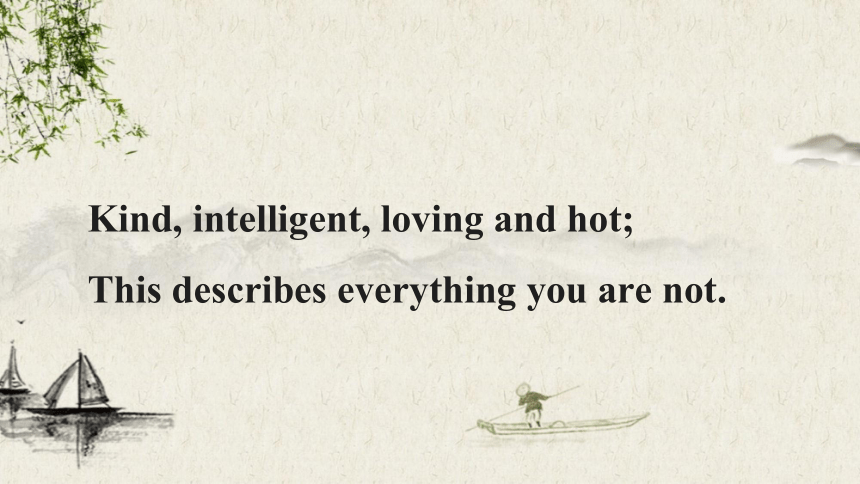
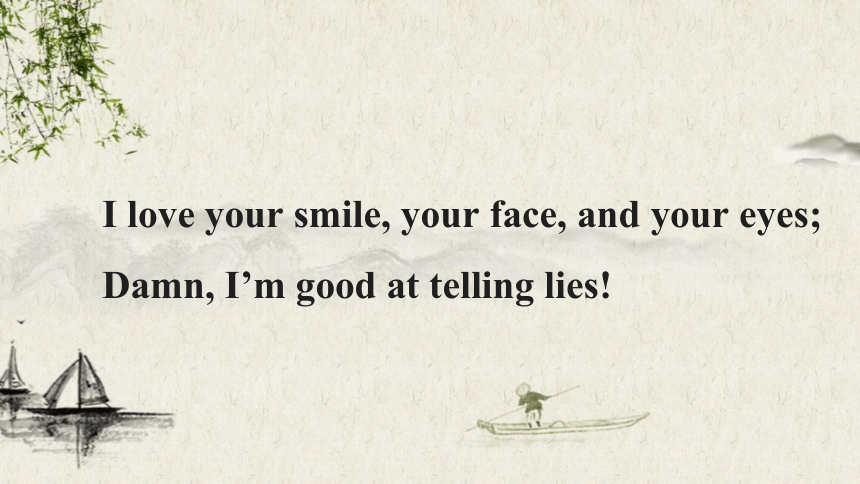
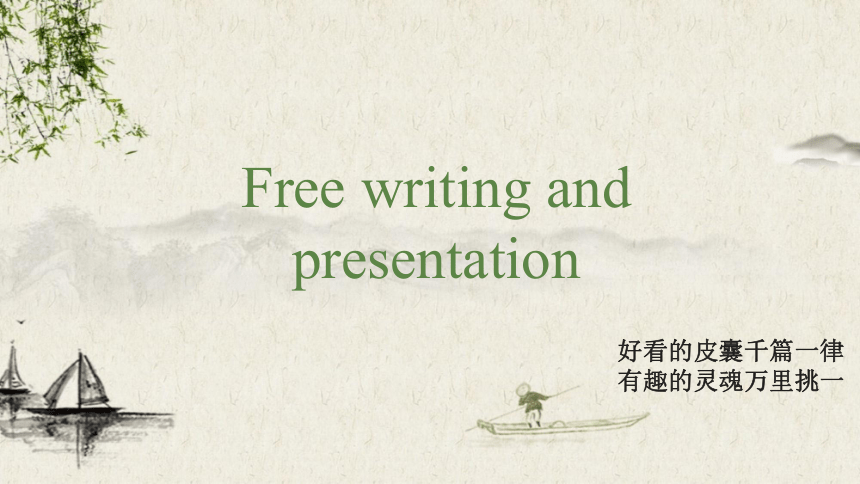
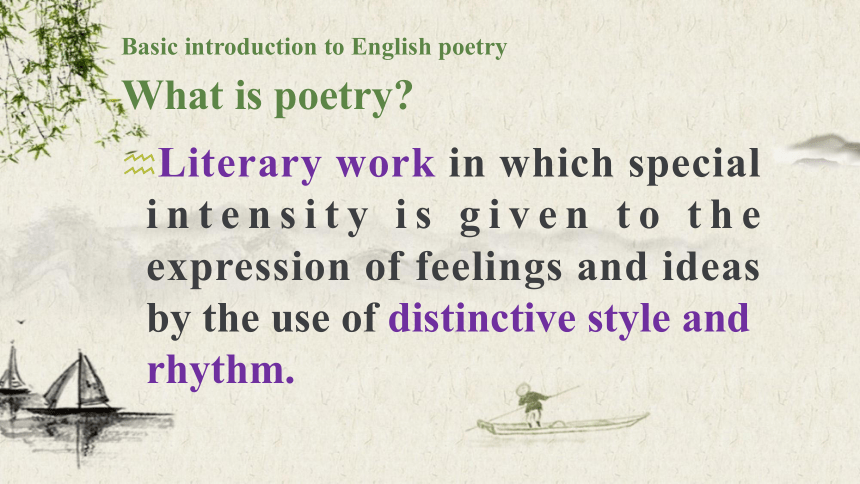
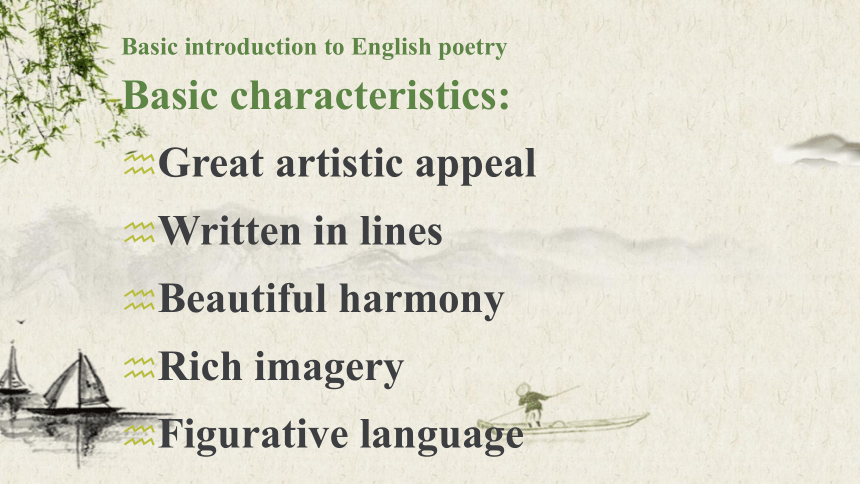
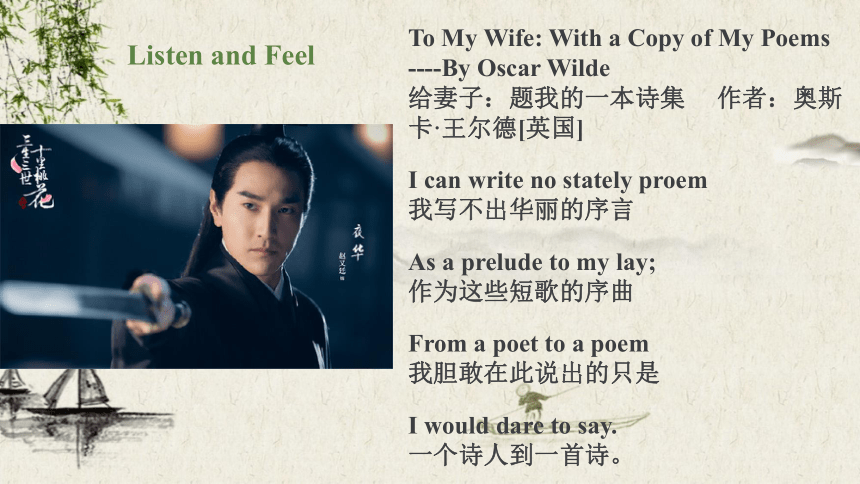
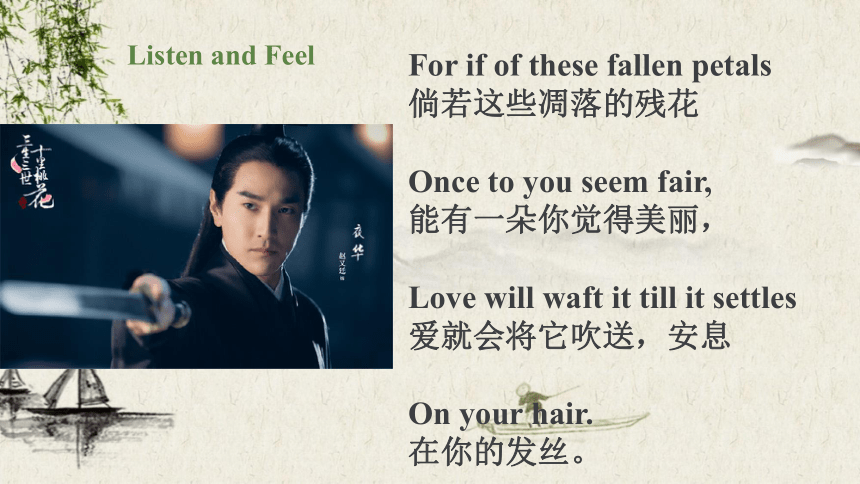

文档简介
(共42张PPT)
English Poetry
Brief introduction to the course
Aims
Get to know the basic knowledge of English poetry
Learn to appreciate English poems
Learn to write your own poems
Requirements
Participate. (write/recite poems…)
Ask questions. (terms/techniques…)
Washington Post organized a 2-line poem contest with the following request:
The first line should be as romantic as possible, while the second one should be at least romantic as possible.
Funny Poems
I see your face when I am dreaming,
That’s why I always wake up screaming.
Kind, intelligent, loving and hot;
This describes everything you are not.
I love your smile, your face, and your eyes;
Damn, I’m good at telling lies!
Free writing and presentation
好看的皮囊千篇一律
有趣的灵魂万里挑一
Basic introduction to English poetry
What is poetry
Literary work in which special intensity is given to the expression of feelings and ideas by the use of distinctive style and rhythm.
Basic introduction to English poetry
Basic characteristics:
Great artistic appeal
Written in lines
Beautiful harmony
Rich imagery
Figurative language
Listen and Feel
To My Wife: With a Copy of My Poems ----By Oscar Wilde
给妻子:题我的一本诗集 作者:奥斯卡·王尔德[英国]
I can write no stately proem 我写不出华丽的序言
As a prelude to my lay; 作为这些短歌的序曲
From a poet to a poem 我胆敢在此说出的只是
I would dare to say. 一个诗人到一首诗。
Listen and Feel
For if of these fallen petals 倘若这些凋落的残花
Once to you seem fair, 能有一朵你觉得美丽,
Love will waft it till it settles 爱就会将它吹送,安息
On your hair. 在你的发丝。
Listen and Feel
And when wind and winter harden 当北风与冬天让一切凝固,
All the loveless land, 一切变成爱的荒原,
It will whisper of the garden, 它就会低诉花园的絮语,
You will understand. 你就会恍然大悟。
Basic introduction to English poetry
Basic notions:
Line
The first letter of each line is capitalized.
1) end-stopped line(结句行): A line ending at a grammatical boundary or break with punctuation such as a colon, a semicolon, or a period.
Basic introduction to English poetry
Basic notions:
Line
My last will 我的遗嘱 ----Joe Hill
My will is easy to decide, 我的遗嘱轻易确定,
For there is nothing to divide. 因为我并无财产分给所爱。
My kin don’t need to fuss and moan----亲人不必抱怨,悲哀——
“Moss does not cling to rolling stone.” “滚石不生苔,我也不聚财。”
Basic introduction to English poetry
Basic notions:
Line
2) run-on line(跨句行)
The running-over of a sentence or phrase from one poetic line to the next, without terminal punctuation.
Between Walls
by William Carlos Williams
the back wings
of the
hospital where
nothing
will grow lie
cinders
in which shine
the broken
pieces of a green
bottle
Basic introduction to English poetry
Basic notions:
Line
I shot an arrow into the air,
It fell to earth, I knew not where;
For, so swiftly it flew, the sight
Could not follow it in its flight.
Basic introduction to English poetry
Basic notions:
Stanza
A stanza is a group of lines ( of any number of lines, most frequently of four lines ) bound together.
The Wind
Who has seen the wind
Neither I nor you;
But when the leaves hang trembling,
The wind is passing through.
Who has seen the wind
Neither you nor I;
But when the trees bow down their heads,
The wind is passing by.
Sound Patterns in English Poetry
Read and Feel
Night Thoughts
I wake, and moonbeams play around my bed,
Glittering like hoar-frost to my wandering eyes;
Up towards the glorious moon I raise my head,
Then lay me down---and thoughts of home arise.
There are differences.
Read and Feel
Rhyme: It can roughly be divided into two types: internal rhyme and end rhyme
1) Internal rhyme
a) Alliteration (头韵): the repetition of initial identical consonant sounds.
The fair breeze blew, the white foam flew
I slip, I slide, I gloom, I glance
While I nodded, nearly napping,
Suddenly there came a tapping.
The sound pattern
b) Assonance (腹韵/元音叠韵/半谐音): the repetition of similar or identical vowel sounds in a line ending with different consonant sounds.
Little strokes fell great oaks.水滴石穿
I feel the need, the need for speed.
The sound pattern
c) Consonance (假韵): the repetition of the ending consonant sounds with different preceding vowels of two or more words in a line.
At once a voice arose…
Strong reasons make strong actions.
The sound pattern
2) End rhyme: lines in a poem end in similar or identical stressed syllables.
When two or more words or phrases contain an identical or similar vowel sound, and the consonant sounds that follow the vowel sound are identical and preceded by different consonants, a rhyme occurs.
The sound pattern
Rhyme Scheme
1) aabb(连续韵):
Work while you work, and play while you play, a
For that is the way to be happy and gay. a
All that you do, do with your might, b
Things done by halves are never done right. b
2) abab(交叉韵):
How do you like to go up in a swing, a
Up in the air so blue b
Oh, I do think it the pleasantest thing a
Ever a child can do! b
Rhyme Scheme
3) abba(首尾韵):
I hold it true , whatever befall; a
I feel it when I sorrow most; b
It is better to have loved and lost b
Than never to have loved at all. a
Rhyme Scheme
4) abcb(二四韵):
Spring is green, a
Summer is bright, b
Autumn is gold, c
Winter is white. b
Rhyme Scheme
The Wind
Who has seen the wind
Neither I nor you;
But when the leaves hang trembling,
The wind is passing through.
Who has seen the wind
Neither you nor I;
But when the trees bow down their heads,
The wind is passing by.
Rhyme Scheme
The Swing 秋千
How do you like to go up in a swing,
你喜欢荡一趟秋千,
Up in the air so blue
置身于蓝蓝的晴空吗?
Oh, I do think it the pleasantest thing
啊,我认为这是小孩所能做到的
Ever a child can do.
最愉快的玩耍。
Rhyme Scheme
The Swing 秋千
Up in the air and over the wall,
越过墙外高踞天空,
Till I can see so wide,
直到我能望见如此广大的世界,
River and trees and cattle and all
河流、树木、牛群,
Over the countryside----
还有整个的乡村。
Rhyme Scheme
The Swing 秋千
Till I look down on the garden green
直到我俯瞰着翠绿的花园
Down on the roof so brown----
以及棕色的屋顶
Up in the air I go flying again
我又飞上天去,
Up in the air and down!
在天地间上下穿梭!
Rhyme Scheme
Word Choice in English Poetry
Choosing the Right Word
Diction = word choice
Today, most poets prefer colloquial and general English. Poems tend to not use difficult words, they use words with deep possibilities for meaning.
Go for the right word, not the big and fancy word.
Denotation: the dictionary definition of a word
Connotation: the feel of a word
These words all have the same denotation, but which one has the warmest connotation
offspring, children, kids
Choosing the Right Word
Destroying a Poem
Hold fast to dreams
For if dreams die
Life is a broken-winged bird
That cannot fly
Clasp expeditiously to reveries
Because if reveries decease
Existence is a fractured winged fowl
That is incapable of circumnavigating
Writing limericks
Five lines
aabba
There was an old man with a beard
Who said, “it’s just how I feared!
Two owls and a hen,
Four larks and a wren,
Have all built their nests in my beard.”
I have a lovely cat,
She likes to sleep on a soft mat.
Dad bought her a house,
Mom sent her a mickey mouse,
Which is her own pat.
Writing limericks
My Lovely Cat
Writing limericks
I take photos of her everyday,
Sometimes we walk near the bay.
She usually runs fast,
Or leaves me on the vast,
Like she was on a sleigh.
My Lovely Cat
She is my best friend,
As she tries hard to comprehend
What is right
So sleeps late at night,
I believe our relationship will never end.
Writing limericks
My Lovely Cat
Heart start art
End friend
Bliss kiss
Flow blow
Late great
Writing limericks
Down frown brown
Boy toy joy enjoy
Might night bright light fight
Here fear tear hear
Meet street eat beat
Sadly happily successfully
See sea bee key
Homework
1. Carefully destroy the diction: too fancy, too big, same denotation but not the right connotation
Pay attention to what you are destroying: diction / rhyme / pauses and breaks, etc.
Hold fast to dreams
For when dreams go
Life is a barren field
Frozen with snow.
2. Write 2 limericks. Make a note of what techniques you are using.
English Poetry
Brief introduction to the course
Aims
Get to know the basic knowledge of English poetry
Learn to appreciate English poems
Learn to write your own poems
Requirements
Participate. (write/recite poems…)
Ask questions. (terms/techniques…)
Washington Post organized a 2-line poem contest with the following request:
The first line should be as romantic as possible, while the second one should be at least romantic as possible.
Funny Poems
I see your face when I am dreaming,
That’s why I always wake up screaming.
Kind, intelligent, loving and hot;
This describes everything you are not.
I love your smile, your face, and your eyes;
Damn, I’m good at telling lies!
Free writing and presentation
好看的皮囊千篇一律
有趣的灵魂万里挑一
Basic introduction to English poetry
What is poetry
Literary work in which special intensity is given to the expression of feelings and ideas by the use of distinctive style and rhythm.
Basic introduction to English poetry
Basic characteristics:
Great artistic appeal
Written in lines
Beautiful harmony
Rich imagery
Figurative language
Listen and Feel
To My Wife: With a Copy of My Poems ----By Oscar Wilde
给妻子:题我的一本诗集 作者:奥斯卡·王尔德[英国]
I can write no stately proem 我写不出华丽的序言
As a prelude to my lay; 作为这些短歌的序曲
From a poet to a poem 我胆敢在此说出的只是
I would dare to say. 一个诗人到一首诗。
Listen and Feel
For if of these fallen petals 倘若这些凋落的残花
Once to you seem fair, 能有一朵你觉得美丽,
Love will waft it till it settles 爱就会将它吹送,安息
On your hair. 在你的发丝。
Listen and Feel
And when wind and winter harden 当北风与冬天让一切凝固,
All the loveless land, 一切变成爱的荒原,
It will whisper of the garden, 它就会低诉花园的絮语,
You will understand. 你就会恍然大悟。
Basic introduction to English poetry
Basic notions:
Line
The first letter of each line is capitalized.
1) end-stopped line(结句行): A line ending at a grammatical boundary or break with punctuation such as a colon, a semicolon, or a period.
Basic introduction to English poetry
Basic notions:
Line
My last will 我的遗嘱 ----Joe Hill
My will is easy to decide, 我的遗嘱轻易确定,
For there is nothing to divide. 因为我并无财产分给所爱。
My kin don’t need to fuss and moan----亲人不必抱怨,悲哀——
“Moss does not cling to rolling stone.” “滚石不生苔,我也不聚财。”
Basic introduction to English poetry
Basic notions:
Line
2) run-on line(跨句行)
The running-over of a sentence or phrase from one poetic line to the next, without terminal punctuation.
Between Walls
by William Carlos Williams
the back wings
of the
hospital where
nothing
will grow lie
cinders
in which shine
the broken
pieces of a green
bottle
Basic introduction to English poetry
Basic notions:
Line
I shot an arrow into the air,
It fell to earth, I knew not where;
For, so swiftly it flew, the sight
Could not follow it in its flight.
Basic introduction to English poetry
Basic notions:
Stanza
A stanza is a group of lines ( of any number of lines, most frequently of four lines ) bound together.
The Wind
Who has seen the wind
Neither I nor you;
But when the leaves hang trembling,
The wind is passing through.
Who has seen the wind
Neither you nor I;
But when the trees bow down their heads,
The wind is passing by.
Sound Patterns in English Poetry
Read and Feel
Night Thoughts
I wake, and moonbeams play around my bed,
Glittering like hoar-frost to my wandering eyes;
Up towards the glorious moon I raise my head,
Then lay me down---and thoughts of home arise.
There are differences.
Read and Feel
Rhyme: It can roughly be divided into two types: internal rhyme and end rhyme
1) Internal rhyme
a) Alliteration (头韵): the repetition of initial identical consonant sounds.
The fair breeze blew, the white foam flew
I slip, I slide, I gloom, I glance
While I nodded, nearly napping,
Suddenly there came a tapping.
The sound pattern
b) Assonance (腹韵/元音叠韵/半谐音): the repetition of similar or identical vowel sounds in a line ending with different consonant sounds.
Little strokes fell great oaks.水滴石穿
I feel the need, the need for speed.
The sound pattern
c) Consonance (假韵): the repetition of the ending consonant sounds with different preceding vowels of two or more words in a line.
At once a voice arose…
Strong reasons make strong actions.
The sound pattern
2) End rhyme: lines in a poem end in similar or identical stressed syllables.
When two or more words or phrases contain an identical or similar vowel sound, and the consonant sounds that follow the vowel sound are identical and preceded by different consonants, a rhyme occurs.
The sound pattern
Rhyme Scheme
1) aabb(连续韵):
Work while you work, and play while you play, a
For that is the way to be happy and gay. a
All that you do, do with your might, b
Things done by halves are never done right. b
2) abab(交叉韵):
How do you like to go up in a swing, a
Up in the air so blue b
Oh, I do think it the pleasantest thing a
Ever a child can do! b
Rhyme Scheme
3) abba(首尾韵):
I hold it true , whatever befall; a
I feel it when I sorrow most; b
It is better to have loved and lost b
Than never to have loved at all. a
Rhyme Scheme
4) abcb(二四韵):
Spring is green, a
Summer is bright, b
Autumn is gold, c
Winter is white. b
Rhyme Scheme
The Wind
Who has seen the wind
Neither I nor you;
But when the leaves hang trembling,
The wind is passing through.
Who has seen the wind
Neither you nor I;
But when the trees bow down their heads,
The wind is passing by.
Rhyme Scheme
The Swing 秋千
How do you like to go up in a swing,
你喜欢荡一趟秋千,
Up in the air so blue
置身于蓝蓝的晴空吗?
Oh, I do think it the pleasantest thing
啊,我认为这是小孩所能做到的
Ever a child can do.
最愉快的玩耍。
Rhyme Scheme
The Swing 秋千
Up in the air and over the wall,
越过墙外高踞天空,
Till I can see so wide,
直到我能望见如此广大的世界,
River and trees and cattle and all
河流、树木、牛群,
Over the countryside----
还有整个的乡村。
Rhyme Scheme
The Swing 秋千
Till I look down on the garden green
直到我俯瞰着翠绿的花园
Down on the roof so brown----
以及棕色的屋顶
Up in the air I go flying again
我又飞上天去,
Up in the air and down!
在天地间上下穿梭!
Rhyme Scheme
Word Choice in English Poetry
Choosing the Right Word
Diction = word choice
Today, most poets prefer colloquial and general English. Poems tend to not use difficult words, they use words with deep possibilities for meaning.
Go for the right word, not the big and fancy word.
Denotation: the dictionary definition of a word
Connotation: the feel of a word
These words all have the same denotation, but which one has the warmest connotation
offspring, children, kids
Choosing the Right Word
Destroying a Poem
Hold fast to dreams
For if dreams die
Life is a broken-winged bird
That cannot fly
Clasp expeditiously to reveries
Because if reveries decease
Existence is a fractured winged fowl
That is incapable of circumnavigating
Writing limericks
Five lines
aabba
There was an old man with a beard
Who said, “it’s just how I feared!
Two owls and a hen,
Four larks and a wren,
Have all built their nests in my beard.”
I have a lovely cat,
She likes to sleep on a soft mat.
Dad bought her a house,
Mom sent her a mickey mouse,
Which is her own pat.
Writing limericks
My Lovely Cat
Writing limericks
I take photos of her everyday,
Sometimes we walk near the bay.
She usually runs fast,
Or leaves me on the vast,
Like she was on a sleigh.
My Lovely Cat
She is my best friend,
As she tries hard to comprehend
What is right
So sleeps late at night,
I believe our relationship will never end.
Writing limericks
My Lovely Cat
Heart start art
End friend
Bliss kiss
Flow blow
Late great
Writing limericks
Down frown brown
Boy toy joy enjoy
Might night bright light fight
Here fear tear hear
Meet street eat beat
Sadly happily successfully
See sea bee key
Homework
1. Carefully destroy the diction: too fancy, too big, same denotation but not the right connotation
Pay attention to what you are destroying: diction / rhyme / pauses and breaks, etc.
Hold fast to dreams
For when dreams go
Life is a barren field
Frozen with snow.
2. Write 2 limericks. Make a note of what techniques you are using.
